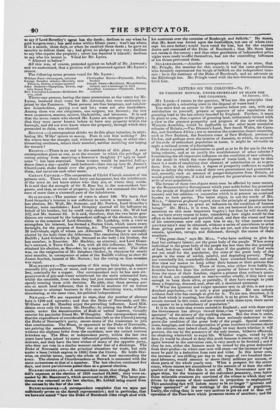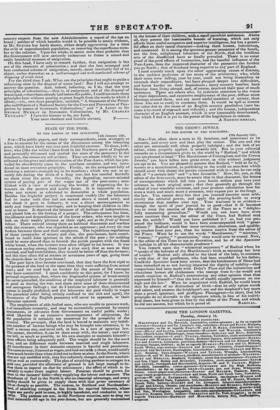LETTERS ON THE COLONIES—No. IV.
TO VISCOUNT HOWICR, UNDER-SECRETARY OF STATE FOR
My LORD—I return to the question, What are the principles that ought to guide a colonizing state in the disposal of waste land ? You must find an answer to this question before you can, with any satisfaction to yourself, prepare or approve of new regulations for granting land in the last colony founded by England. Further, it must be plain to you, that a system of granting land, deliberately formed with a view to the greatest prosperity and progress of the new colony in Western Australia, would be applicable to the other more extensive colonies of Britain,—Van Diemen's Land, New South Wales, the Cana. das, and Southern Africa ; not to mention the numerous desert countries, such as New Zealand, the Southern coast of New Holland, portions of Ceylon, and perhaps even the interior of Jamaica, to which, on account of the evils of redundant population at home, it might he advisable to apply a rational sytem of colonization.
Is there a system of colonization so good as to be fit for use in the ex. isting colonies, and as to justify the establishment of other colonies ? Considering the all-important influence on the condition of new colonies, of the mode in which the state disposes of waste land, it may be that there is a mode of employing that element of colonization so as to pro.. duce, first, in the colonies, a degree of prosperity sufficient to enable them to defray the whole cost of their own government and protection ; and, secondly, such an amount of pauper-emigration from Britain, as would greatly mitigate, if it did not prevent for generations to come, the evils of over-population.
The former of those two objects must soon be effected by some means, or the Representative Government which your noble father has promised to the people of England will sever the connexion between the mother country and her colonies—a connexion which is at present an unmixed burden to both parties. The latter object, to use the words of Mr. MILL, "deserves profound regard, since the principle of population has been found to exert so great an influence on the condition of human beings." Mr. MILL, it is true, has not yet bestowed his own serious attention on this most important inquiry; but that he will shortly do so, we have every reason to hope, considering how slight would be the effort to his instructed and powerful mind, and that the wisest and best of his countrymen now call upon him to say, by what means GOOD GOVERNMENT may be obtained, without a series of convulsions to arise from giving power to the many, who are yet, and who seem likely to remain, ignorant, savage, and dishonest, through the excess of their numbers.
" The great class," says Mr. MILL, "who have nothing to give for food but ordinary labour, are the great body of the people. When every individual in the great body of the people has less than the due quantity of food, less than would fall to his share if the quahtity of food were not too small for the population, the state of the great body of the people is the state of sordid, painful, and degrading poverty. They are wretchedly fed, wretchedly clothed, have wretched houses, and nei. ther time nor means to keep either their houses or their persons free from disgusting impurity. Those of them, who either from bodily in- firmities have less than the ordinary quantity of labour to bestow, or, from the state of their families, require a greater than ordinary quasi- tity of food, are condemned to starve—either wholly, if they have not enough to keep them alive, or partially, if they have enough to yield them a lingering, diseased, and, after all, a shortened existence. " What the ignorant and vulgar spectator sees in all this, is not a re. dundant population,—it is only a poor population. He sees nobody without food who has enough to give for it. To his eye, therefore, it is not food which is wanting, but that which is to be given for it. When events succeed in this train, and are viewed with these eyes, there never • can appear to be a redundancy of population." It is in this train that events succeed in England ; and with these eyes the Government has always viewed them,—an " ignorant and vulgar spectator" of the misery of the working classes. But the time is come, at length, when the small ruling class must seriously endeavour to im- prove the condition of the great body of the people. Special commis. loons, hangings, and the transportation of great numbers to become slaves
in the colonies, may indeed check, though we may doubt whether it will prevent, the use by the peasantry of the only means, hitherto effectual,
for obtaining wherewith to enjoy life. Whether wages, raised by the fires (it would be absurd to deny this truth because it alarms us), will be again lowered to the starvation rate, is very much to be doubted ; and if they be not, either the farmers must be ruined by the great deduction from their profits—in which case rent will cease—or the increase of wages
must be paid by a deduction from rent and tithe. In this latter case, the increase of one shilling per day to the wages of two hundred thou-
sand labourers, would amount to above thirty millions per annum, or three parts of the whole yearly rent. What a prospect for the aria:)• cracy, whose estates are encumbered to the amount of at least the other quarter of the rent ! But this is not all. The Government now en-
gages ships, for the transport of the redundant peasantry, even before those miserable creatures are convicted of the crimes to which they are
driven by the excess of their numbers in proportion to employment.
This astounding, fact will induce many to be no looger " ignorant and vulgar spectators" of the workings of the principle of popnlation.
"Lastly, the ruling class is now very anxious to put an end to that evil operation of the Poor-laws which promotes excess of numbers ; and the
country expects from the new Administration a repeal of the tax on bread ; neither of which benefits would it be possible to attain without, as Mr. SENIOR has lately shown, either deeply aggravating for a time the evils of superabundant population, or removing the superfluous num- ber to the colonies. Upon the whole,-it seems more than probable that the Government will now seriously endeavour to frame a sound and really beneficial measure of emigration. On this head, I have only to remark further, that emigration is but one of the elements of colonization ; and that the best arranged and best conducted scheme of emigration, merely, must inevitably fail of its , object, unless dependent on a well-arranged and well.conducted scheme of disposing of waste land. For the third time I ask, What are the principles that ought to guide a colonizing state in the disposal of waste land ? But I will not attempt to answer the question. And, indeed, believing, as I 'do, that the true principles of colonization,—that is, of emigration and of the disposal of wasteland,--]nave been already laid before the public, I could not state those principles here without quoting at great length from the works to which I allude,—viz., two short pamphlets, entitled, " A Statement of the Princi- ples and Objects of a National Society for the Cure and Prevention of Pau- perism by means of Systematic Colonization," and " A Letter to Sir GEORGE MURRAY .on Systematic Colonization, by Mr. CHARLES TENNANT." I have the honour to be, my Lord,
Your most obedient and humble servant, P—.



























 Previous page
Previous page